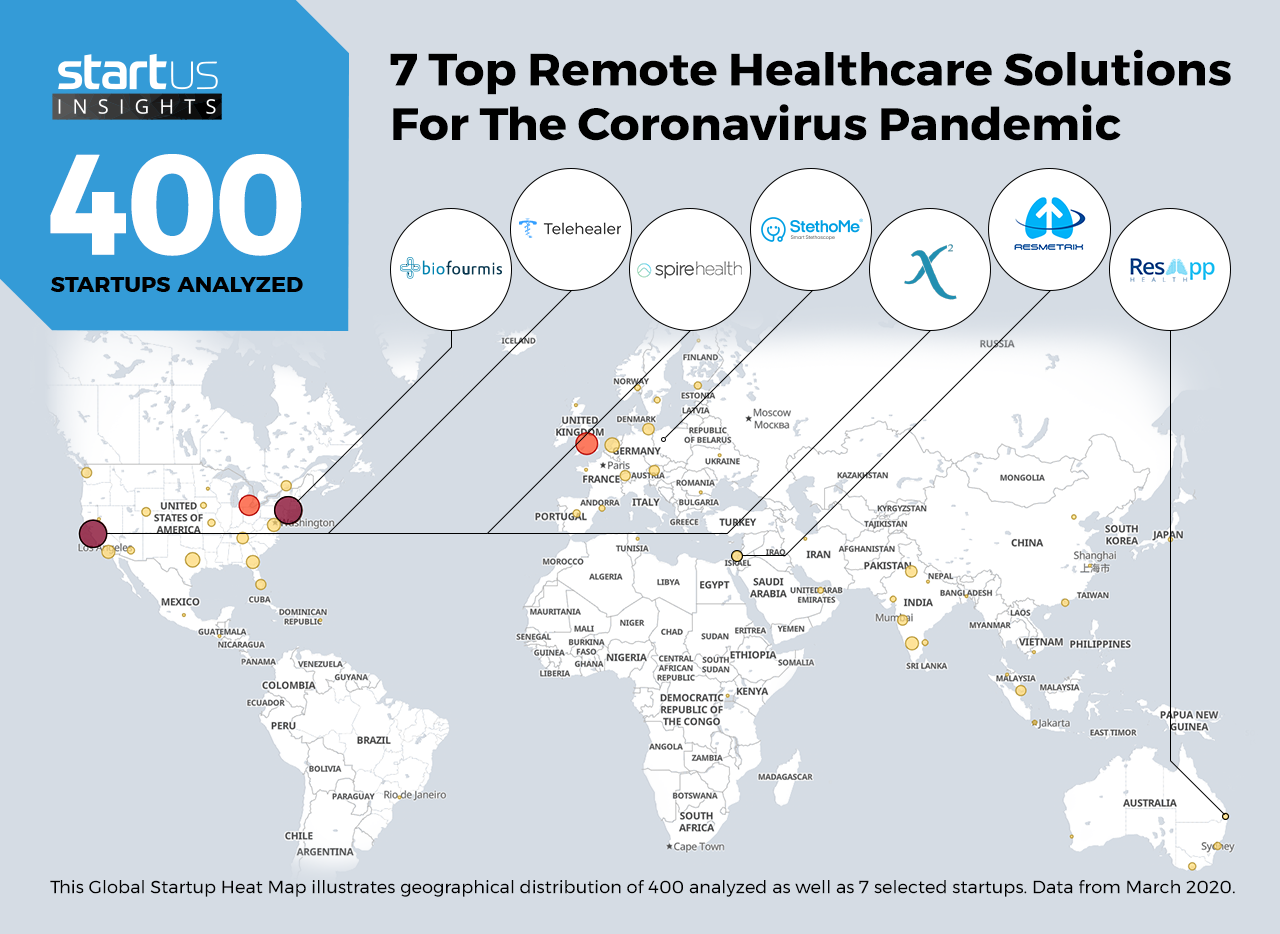Our Innovation Analysts recently looked into emerging technologies and up-and-coming startups working on solutions for remote healthcare during the Coronavirus pandemic.
Heat Map: 7 Top Remote Healthcare Solutions
We use a data-driven startup scouting approach to identify the most relevant solutions globally. The Global Startup Heat Map below highlights 7 interesting examples out of 400 relevant solutions. We analyzed technology-driven solutions that enable remote healthcare for millions of people around the world. Telehealer, X2AI, Biofourmis, Spire Health, Resmetrix, StethoMe, and ResApp Health develop 7 top solutions to watch out for.
Biofourmis – Remote Monitoring
Platforms that combine wearables and data analytics algorithms have multiple use cases in remote monitoring, particularly during situations like the coronavirus outbreak. Clinicians are using such solutions to monitor COVID-19 patients as well as suspected patients in China. These platforms provide personalized predictive analytics to enable effective interventions.
Biofourmis is a US-based startup developing a remote monitoring solution. Their FDA-cleared Artificial Intelligence (AI)-powered platform, Biovitals®, predicts clinical exacerbation before a critical event. The startup’s solution has already been used in China for coronavirus patients’ surveillance. It is also used by research groups to study how SARS-CoV-2 affects the body.
Telehealer – Telehealth
Telehealth platforms enable patients to receive a remote examination and physician’s advice in their homes. Such an opportunity is especially valuable nowadays, in the wake of the coronavirus pandemic. Virtual visits enable people in quarantine to receive medical consultation without exposing others to the risk of getting the virus in waiting rooms of hospitals.
Telehealer is a US-based startup working on a cloud-based HIPPA compliant telehealth platform. The platform enables virtual visits to doctors through private and secure audio/video calls. Further, it also collects patient vitals and records interactions. The platform provides an easy, convenient, and safe alternative to visiting a doctor at the hospital, particularly during a pandemic.
Spire Health – Respiratory Monitoring
Wearables and cloth patches with sensors monitor patient vitals, such as respiratory rate, oxygen saturation, breathing patterns, and body temperature. During the ongoing coronavirus pandemic, they assist in monitoring symptoms of infected and suspected patients. By enabling the remote monitoring of patients, the patches help to limit medical staff from possible exposure to the virus.
Spire Health is a US-based startup providing a patch for long-term respiratory monitoring. The patch is easy and convenient to use and enables long-term adherence, even in elderly patients. The startup gathers clinical-grade data on respiration, including parameters such as rate, variability, inhalation/exhalation time, full-waveform, and pulse rate. Thereby, it identifies changes in respiratory system health and notifies the care team for follow-ups.
StethoMe – Digital Stethoscope
Digital stethoscopes enable people to examine their respiratory health without leaving their home and send the results to their doctor. This is particularly helpful during pandemics, such as the coronavirus outbreak when people are urged to stay home. It bypasses unnecessary visits to hospitals while allowing doctors to examine patients remotely.
StethoMe is a Polish startup offering a clinically validated system for remote examination of the respiratory system to detect abnormalities. StethoMe®‘s AI algorithms perform sound analysis in order to detect and classify abnormal sounds, in some cases being 29% more effective than pulmonologists. The stethoscope and the AI algorithms are certified as CE class 2a devices.
X2AI – Mental Health Chatbot
The COVID-19 outbreak has been stressful for many people around the world. People feel fear and anxiety because of the risk of being or getting infected. The social distancing mandated by many governments further worsens the situation. One of the solutions that address this issue is mental health chatbots that provide people with advice on anxiety management.
The US-based startup X2AI creates Tess, a mental health chatbot, that coaches people to build resilience through tough times. The chatbot is built by clinical psychologists and provides a convenient, secure, and affordable way to receive professional help in dealing with anxiety and stress, such as that caused by the coronavirus pandemic.
Resmetrix – Wearable Sensors
Wearable respiratory monitoring systems, such as wearable sensors and chest straps, continuously track patients’ breathing and other vital signs. This enables health systems to monitor and supervise quarantined or mildly ill COVID-19 patients, thereby avoiding unnecessary hospital trips and preventing exposure to the coronavirus.
Resmetrix is an Israel-based startup produces a comfortable chest strap with a patented sensor for continuous monitoring of a patient’s respiratory patterns and other health parameters. The sensor wirelessly connects to a smartphone app that provides real-time access to respiratory and vital signs for the patient and clinicians. Resmetrix’s wearable system enables the detection of deterioration and improvement in respiratory trends.
ResApp Health – Smartphone Diagnosis
Smartphone apps for the diagnosis of respiratory diseases allow for the remote examination and diagnosis of patients. This is incredibly helpful during the coronavirus pandemic as its symptoms include respiratory conditions. Apps like these enable patients to receive medical examinations at home, eliminating the risk of spreading the virus in overcrowded hospitals.
Australian startup ResApp Health develops a smartphone app that diagnoses respiratory diseases using only the sound of a patient’s cough. ResApp diagnoses and measures the severity of pneumonia, bronchiolitis, and other respiratory diseases. The startup’s smartphone-based acute respiratory disease diagnostic test is CE marked in the European Union and TGA approved in Australia.
How To Flatten The Curve?
This is an unprecedented situation for many of us across the world. The SARS outbreak in the early 2000s claimed 774 lives. That toll was enough to drive research & development and easier healthcare solutions. The fact that several mobile health, e-health, virtual care, remote health, and diagnostics startups and companies are able to respond during a real epidemic is encouraging. With thousands of deaths already, we expect to see numerous new companies offering technology-driven solutions to help doctors, nurses, other health workers, and the larger public.









